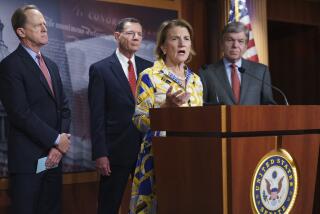Compromise on Internet Taxes
- Share via
The immense potential of the Internet as a vehicle for commerce across local, state and national boundaries presents rich opportunities but a perplexing challenge. As the Internet alters traditional ways of doing business, governments are grappling with the impact on their tax revenues. Washington needs to understand this and seek compromise.
Responding to fears that haphazard taxation might impede the development of Internet commerce, Rep. Christopher Cox (R-Newport Beach) has proposed a tax moratorium for this emerging business sector. Now he wisely has rewritten his bill to reflect concerns of the National Governors Assn.
The revised bill will be taken up soon by the House Judiciary and Commerce committees. It would:
* Cut the moratorium by half, to three years.
* Allow state and local governments to keep tax revenues on Internet access and online services if the levies were in effect March 1, a grandfather clause not in the original bill.
* Expand a proposed congressional panel on Internet taxation to include state and local officials and have it study how to tax sales.
The compromise changes are supported by Gov. Pete Wilson, the National Conference of State Legislators, the National League of Cities, the U.S. Conference of Mayors and the National Assn. of Counties, all with sound reason. Business conducted on the Internet is forecast to grow from $8 billion annually now to $300 billion by 2002, a quantum jump. Taxing agencies need to understand the ramifications of such growth and fashion a coherent, uniform tax policy that encourages Internet commerce while preserving public revenues.






